Nov 21, 2017 | Publications, Studies
-

-
Distinguished Prof James Dale, is developing a cavendish banana that is resistant to Panama Disease
Researchers from Queensland University of Technology in Brisbane, Australia, have designed genetically modified Cavendish bananas with resistance to the devastating soil-borne Panama disease. This disease is caused by the fungus Fusarium oxysporum f.sp. cubense Tropical race 4 (TR4) and also known as Fusarium wilt of banana. Scientists from Wageningen University & Research in the Netherlands validated the field data.
In the world’s first field trial with genetically modified banana plants conducted in heavily TR4-infested soil, one Cavendish line transformed with a gene taken from a wild banana remained completely TR4 free, while three other lines showed robust resistance. The results have just been published in Nature Communications.
The team cloned the so-called RGA2 gene from the wild progenitor of edible bananas, Musaacuminata ssp. Malaccensis, which has a remarkable resistance to TR4. One modified Cavendish line (RGA2-3) remained TR4-free for the three years of the trial. Three other lines modified with RGA2 showed strong resistance, with 20% or fewer plants exhibiting disease symptoms over a period of three years. In contrast, 67% to 100% of the control bananas were either dead or heavily TR4-infected after three years, including the Giant Cavendish somaclonal variant 218, currently heralded as being resistant to TR.4.
Running from 2012 to 2015, the field trial was led by Distinguished Professor James Dale from Queensland University of Technology. It was conducted on a commercial banana plantation outside Humpty Doo in the Northern Territory in Australia previously affected by TR4. The soil was also heavily reinfested with disease for the trial.
“Absolute breakthrough”
The research team of Gert Kema, professor in tropical phytopathology at Wageningen University & Research, partnered in the project. “The GM banana lines show that the activity of the RGA2 gene is strongly correlated with the level of resistance to TR4,” comments Kema. “This is an absolute breakthrough as it concerns the first identified resistance gene to Fusarium wilt. However, this is only the start – some light at the end of the tunnel. The next step is to deploy the immense diversity in wild bananas to diversify the fruit and establish a resilient and sustainable banana production for all. In 2012, we determined that this banana species has valuable resistance to TR4 and Professor Dale’s group has now confirmed this by cloning the underlying gene. Our role was to validate the fungal infections using the molecular techniques that we developed to detect and quantify TR4.”
While Cavendish bananas have been found to also have this RGA2 gene naturally, it is not very active in susceptible plants. New research is looking at how to ‘switch on’ the gene in Cavendish bananas to make them TR4 resistant.
The researchers have begun an expanded field trial on the same plantation, growing the four resistant RGA2 lines and newly developed lines of modified Grand Nain and Williams Cavendish varieties. They have the capacity to screen up to 9,000 plants for resistance and to determine yields and other important traits over the coming five years.
The article, Transgenic Cavendish bananas with resistance to Fusarium wilt tropical race 4, can be accessed here.
For further information, please contact prof. Dr. Ir. Gert Kema tel 00 31 317 480632 or by e-mail: gert.kema@wur.nl
Co-authors with Professor Dale are Professor Gert Kema, Fernando Garcia-Bastidas (Wageningen University & Research, the Netherlands), Dr Anthony James (QUT), Dr Jean-Yves Paul (QUT), Dr Harjeet Khanna (Sugar Research Australia, formerly QUT), Mark Smith (Darwin Banana Farming Company), Dr Santy Peraza-Echeverria (CICY, Mexico, formerly QUT), Professor Peter Waterhouse (QUT), Distinguished Professor Kerrie Mengersen (QUT) and Professor Robert Harding (QUT).
Back to News page
Feb 24, 2017 | Publicity
We are proud to present our new website: www.fusariumwilt.org . Panamadisease.org will maintain accessible, but there is a serious plea to dissociate the name Panama from the disease in banana. The main reason, though was to keep up with the current requirements to ensure a future proof site that can also be viewed on mobile devices. The positive feed-back on the previous site was overwhelming and hence, we hope you enjoy visiting the new website even more.
The new website is fully responsive, so it will look great on your dekstop, laptop, tablet and smartphone. The new site was designed and built by Neo & Co.
Mail us at info@panamadisease.org for any suggestions or questions about Fusarium wilt.
Back to News page
Jan 15, 2017 | Studies
-
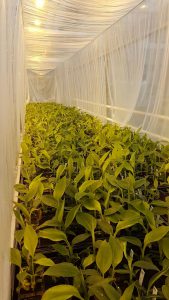
-
Rahan Meristem project
Rahan Meristem, and Wageningen University & Research have engaged into a project targeting at identifying Cavendish bananas with improved resistance to Panama disease or Fusarium wilt caused by Fusarium oxysporum f.sp. cubense Tropical Race 4.
Rahan Meristem is an agro-biotechnology company with more than 30 years of experience in plant propagation and breeding. They produce millions of plants every year and export to more than 20 countries around the world. They are a privately owned company headquartered in Rosh Hanikra, Israel, with additional production facilities in Colombia, the Philippines and Ecuador. And they have a distribution center in Costa Rica. They are experts in the propagation and breeding of bananas and plantains. What’s more, they are currently the largest in vitro banana and plantain producing company in the Western world. Their plant improvement programs specialize in “tailor designed” cultivated varieties for specific needs and environmental conditions.
For more information about this sponsor/partner check the website:
http://www.rahan.co.il
Back to News page
Dec 1, 2016 | Meeting, Visit
-
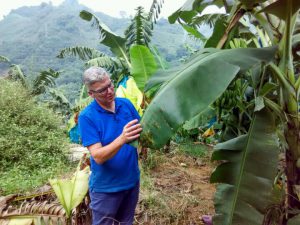
-
Gert Kema in China
-
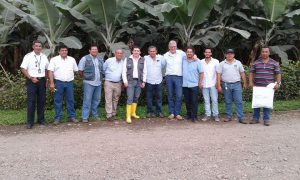
-
Gert Kema in Ecuador
-
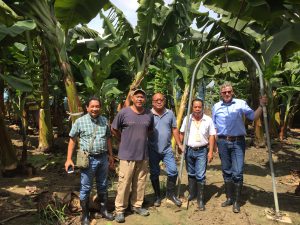
-
Gert Kema in The Philippines
-
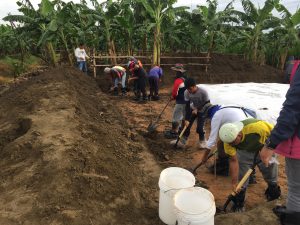
-
Anaerobic soil disinfestation trial kick off. Philippines
-
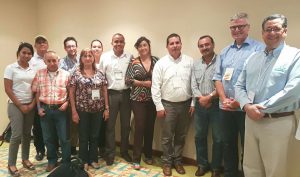
-
Meeting with ICA, Santa Marta, Colombia
During the autumn of 2016 Gert Kema visited several important banana research teams and banana production regions and discussed many ongoing and new research projects around the globe.
Philippines
Kema visited the Philippines from September 26-October 1 where he worked with PhD student Maricar Salacinas, and various INREF partners to start a field trial on anaerobic soil disinfestation to reduce the Foc inoculum in soils. He then continued to Indonesia to work with the Indonesian PI’s on administrative details of the KNAW-SPIN project and to discuss and prepare a joint science week later during the year (see below).
Colombia
Gert Kema continued to Colombia with PhD student Fernando Garcia who addressed the banana growers in Santa Marta on the progress of the INREF program and to discuss current and future collaborative projects with the national banana corporation (AUGURA), the banana producers of Santa Marta (ASBAMA) and the National Agricultural Institute (ICA).
Mr. Fernando García-Bastidas MSc, Colombian PhD student in the INFEF program at Wageningen University and Research, was the main instructor during two banana Fusarium wilt training sessions in October and November 2016 at the substations of Instituto Colombiano Agropecuario (The Colombian Agricultural Institute ) (ICA) in Antioquia and Barranquilla, Colombia. Fernando trained ICA staff in the identification of Fusarium wilt in the field and in laboratory detection through molecular techniques including PCR, qPCR and LAMP
Ecuador
In Ecuador Gert met various partners and discussed collaborative research and participated in the 13th International banana forum organized by ESPOL university and the Ecuadorian Banana Exporter Association (AEBE) where he gave a talk on the latest findings with respect of the genetic diversity in Fusarium oxysporum f.sp. cubense, the Fusarium wilt pathogen of banana. Gert also visited several banana producers to discuss the current problems and perspectives on-site in Quevedo and in Guayaquil together with Dr. Egbert Spaans, the Dutch honorary consul of The Netherlands in Guayaquil.
China
In China Gert visitied Dr. Sijun Zheng, Bioversity International and Yunnan Academy of Agricultural Sciences, in Kunming, China for a seminar and a field visit in southern Yunnan, bordering Vietnam, and from there continued to give a talk at the Southern China Agricultural University in Guangzhou. There he also continued the discussion on the possibility for collaboration between SCAU and Wageningen University & Research that was kicked off last May in Wageningen during a visit of a SCAU delegation.
Indonesia
After China, Gert continued to Indonesia for a science week with all KNAW-SPIN PhD students, the three post-docs and the Indonesian and Dutch PI’s. During this week the group studied overall diversity along 16 transects from a societal, agro-ecological, soil and disease perspective at four different sites on Java (see article on this subject below).
Back to News page
Nov 23, 2016 | Meeting
-
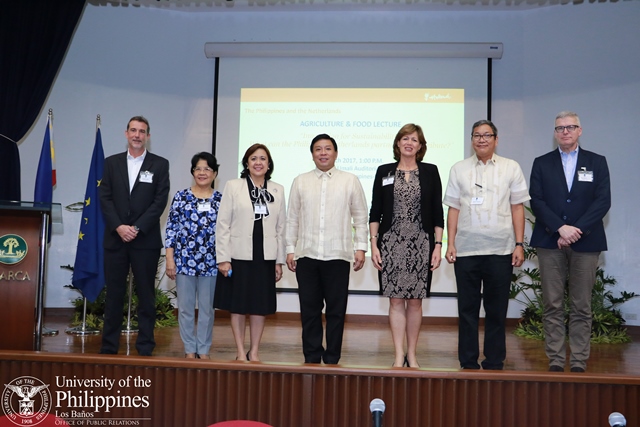
-
Innovation for sustainability: What can the Philippine-Netherlands partnership contribute?
A high diplomatic delegation from the Philippines visited Wageningen University and Research as well as several spin-off companies with major activities in Mindanao on November 22. The delegation comprised of Arnel V. de Mesa (National Deputy Project Director, Philippine Rural Development Project, Philippine Department of Agriculture), Marjorie Grace Rafols (Project Development Associate, Philippine Rural Development Project, Philippine Department of Agriculture), Rep. Jericho Jonas B. Nograles (Member, Philippine House or Representatives) and Erlinda Z. Aquino (Consultant, Philippine House of Representatives).
The interest of the delegation was primarily in banana R&D and potential technologies that can be implemented in the Philippines. Gert Kema incorporated several examples of technology push in an invited talk at a meeting titled “Innovation for sustainability: What can the Philippine-Netherlands partnership contribute”, which was organized at UP Los Baños to celebrate the 150th and centennial consular and diplomatic relationship between the Philipines and The Netherlands on March 10. Prof. Kema illustrated how the Netherlands made the agricultural sector attractive to young people by applying high end technology to the field. Besides, this use of high technology guaranteed a stable and relatively high income for farmers.
Back to News page
Nov 22, 2016 | Meeting, Visit
-
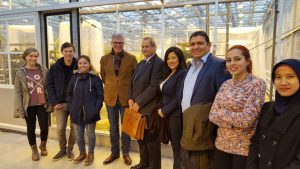
-
Minister of Agriculture of Costa Rica visited Wageningen University and Research
On 21 November Mr. Luis Felipe Arauz, Minister of Agriculture of Costa Rica visited the banana program at WUR. Gert Kema and Rafael Segura Mena, INREF sandwich PhD from the national banana coporation of Costa Rica (Corbana), had the honour to explain ongoing banana research with a focus on Panama disease and black Sigatoka. The minister has a PhD in plant pathology from UC Davis and served as professor at the University of Costa Rica. As banana is among the most important export crops of Costa Rica, no wonder a lively discussion developed next to the greenhouse with over 4,000 young banana plants.
Also visite the official website of the Ministry Of Agriculture of Costa Rica:
http://www.mag.go.cr/
Back to News page
Nov 18, 2016 | Studies
-

-
Backyard sampling KNAW-SPIN project, Central Java
The Indonesian-Dutch research team investigates social, agro-ecological and biological conditions for conserving diversity of bananas. Bananas are deep-rooted in the Indonesian landscape and form an essential ingredient of the daily menu of people in cities and villages. It seems unthinkable that the various uses of bananas, such as eating or sharing fresh bananas, selling bunches to local traders, manufacturing banana chips or wrapping food in banana leaves, will disappear.
The international and interdisciplinary research collaboration focusing on the diversity of Indonesian bananas is funded by the Royal Netherlands Academy of Arts and Sciences (KNAW) – Scientific Programme Indonesia – Netherlands (KNAW-SPIN) and a range of scholarships through the Indonesian Directorate General for Higher Education (DIKTI). The programme provides training of four PhD candidates, three post-doctoral research fellows, and a small group of Indonesian master students. The partnership involves the Universitas Gadjah Mada (UGM) in Yogyakarta, the Institut Pertanian Bogor (IPB) in Bogor, the Lembaga Ilmu Pengetahuan Indonesia (LIPI) in Cibinong and Wageningen University & Research, the University of Amsterdam (UvA), the KNAW-Netherlands Institute of Ecology (NIOO-KNAW), and the KNAW-Westerdijk Fungal Biodiversity Institute. The KNAW-SPIN project on banana is coordinated by Professor Gert Kema (WUR) and Professor Siti Subandiyah (UGM).

One of the locations on Central Java (Indonesia) where samples were taken (click image to see location)
Back to News page
Nov 10, 2016 | Studies
-
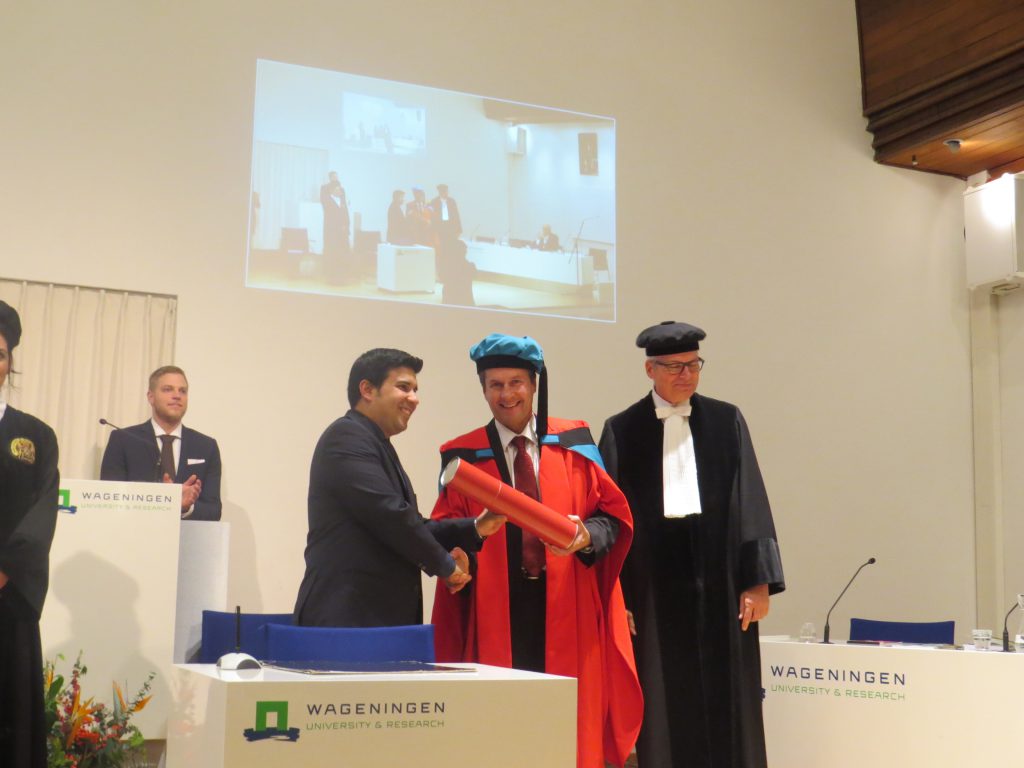
-
Pablo Chong Aguirre graduates at Wageningen University and Research
-
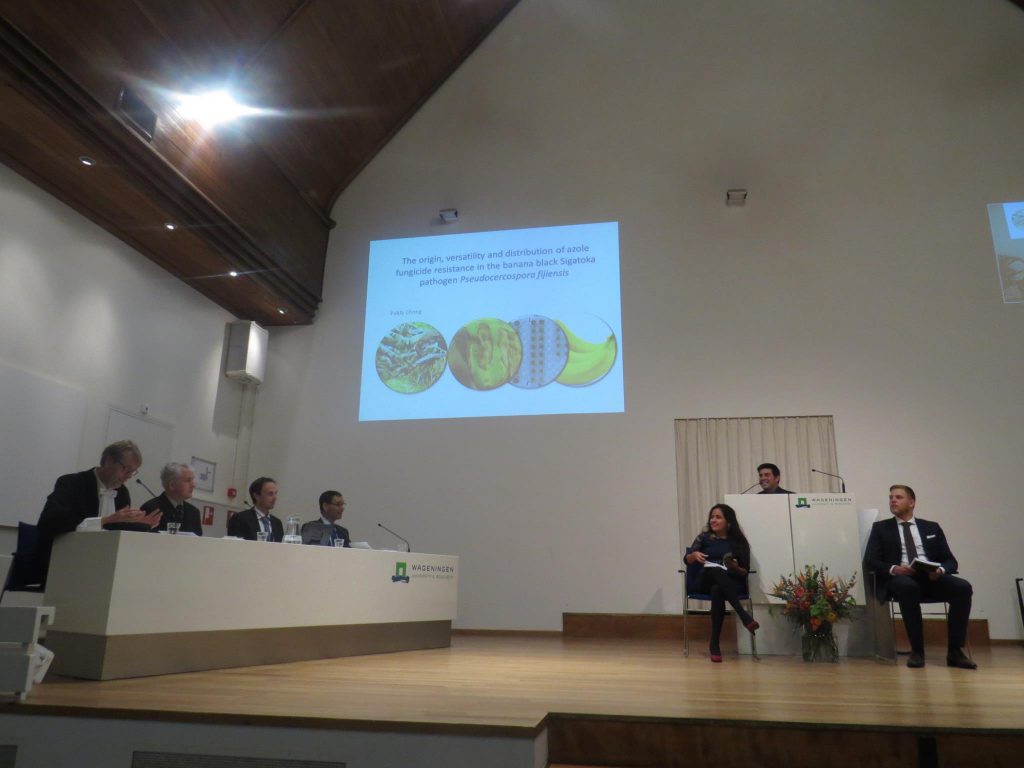
-
Pablo Chong Aguirre defends his PhD thesis at Wageningen University & Research
On Monday 31 October 2016 Pablo Chong Aguirre, originating from Ecuador, successfully defended his PhD thesis on “The origin, versatility and distribution of azole fungicide resistance in the banana black Sigatoka pathogen Pseudocercospora fijiensis”. Professors Pedro Crous and Gert Kema, Pablo’s supervisors, proudly presented the diploma to Pablo. The research papers from Pablo’s thesis are foreseen for 2017.
Read about the PhD thesis that Pablo Chong Aguirre defended here:
https://www.wur.nl/nl/activiteit/The-originversatility-and-distribution-of-azole-fungicide-resistance-in-the-banana-black-Sigatoka-pathogen-Pseudocercospora-fijiensis.htm
Summary
Pseudocercospora fijiensis causes black Sigatoka disease of banana. It is one of the most damaging threats of the crop requiring excessive fungicide applications for disease control as the major export “Cavendish” clones are highly susceptible. The consequence of this practice is the reduced efficacy of disease management strategies due to increasing levels of fungicide resistance. In this thesis the history and current practices of black Sigatoka disease management as well as the underlying mechanisms of fungicide resistance to a major group of fungicides are described. We discovered that both target site mutations and promotor insertions are crucial for modulating sensitivity. The more insertions, the higher the expression of the gene and the more resistant the strain. Using this information, we advocate modern monitoring techniques and improved disease control strategies as well as the urgent need for innovative banana breeding to develop resistant varieties for a sustainable global banana production.
Back to News page
Oct 30, 2016 | Publications, Publicity
-
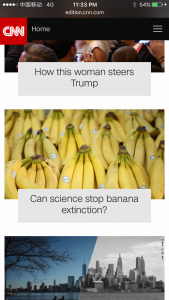
-
Article on The conversation covered by CNN
Ioannis Stergiopoulos, Assistant Professor of Plant Pathology, University of California, Davis; André Drenth, Professor of Agriculture and Food Sciences, The University of Queensland and Gert Kema, Special Professor of Phytopathology, Wageningen University wrote an article for ‘The conversation’, the communication platform with ‘Academic rigour & journalistic flair’. With the article, Ioannis, André and Gert try to answer the question whether science can help the endangered Cavendish banana to survive. The piece attracted very much interest of news media, it even reached the homepage of CNN.
Check the CNN page here:
http://edition.cnn.com/2016/10/25/health/banana-extinction/index.html
You can read the entire article here on The Conversation:
https://theconversation.com/with-the-familiar-cavendish-banana-in-danger-can-science-help-it-survive-64206
The Conversation is an independent source of news and views, sourced from the academic and research community and delivered direct to the public. Their team of professional editors work with university and research institute experts to unlock their knowledge for use by the wider public.
Back to News page
Aug 20, 2016 | Publications
-
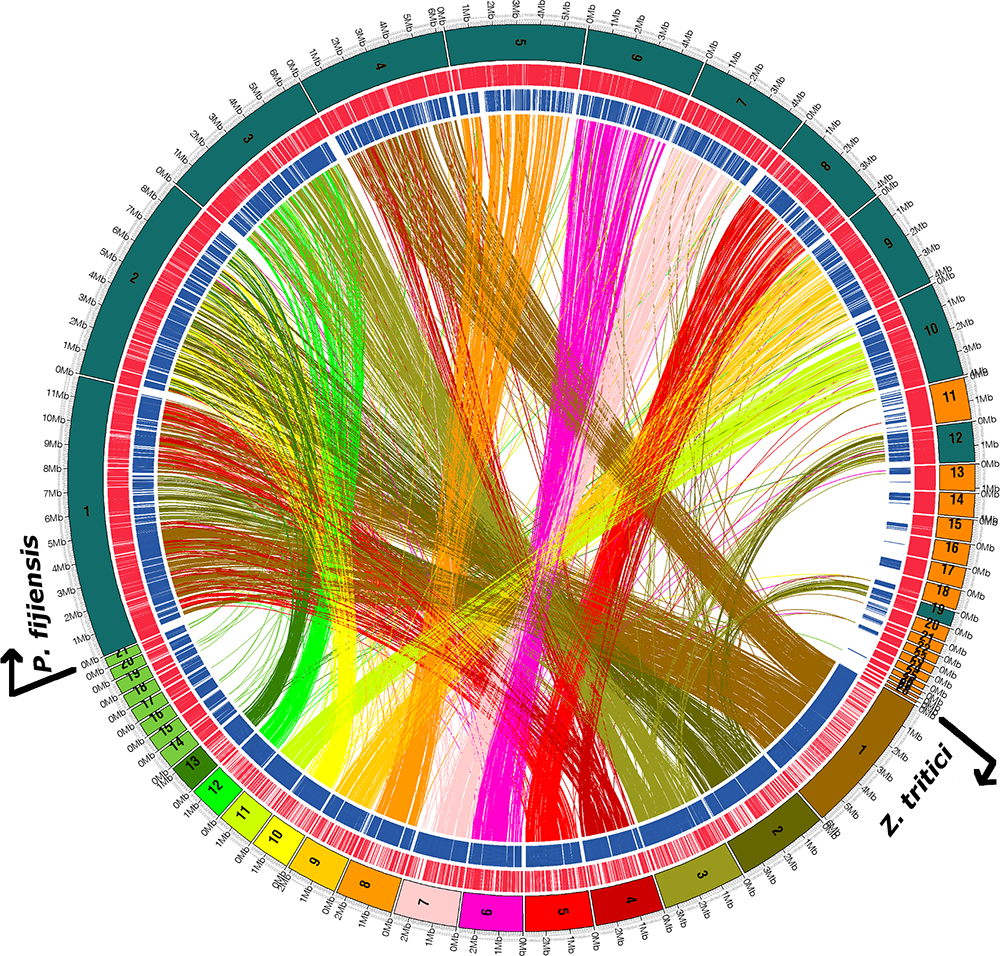
-
DNA of banana fungus unravelled for more sustainable banana crops
DNA of banana fungus unravelled for more sustainable banana crops. An international consortium led by Prof. Gert Kema from Wageningen University and Research has unravelled the DNA of Pseudocercospora fijiensis, the fungus that causes the dreadful black Sigatoka disease in bananas. The findings provide leads for increasing the sustainability of banana cultivation. For instance through the development of a resistant banana plant. The results were published in the scientific magazine PLoS Genetics.
Read more at: http://www.wur.nl/nl/nieuws/dna-banana-black-sigatoka.html
Read more at: http://journals.plos.org/plosgenetics/article?id=10.1371/journal.pgen.1005876
More information about Black Sigatoka
Black Sigatoka or black leaf streak disease, caused by the ascomycete fungus Pseudocercospora fijiensis, inflicts huge costs on banana producers, due to crop losses and expenses for disease control. The global banana export trade relies on Cavendish clones that are highly susceptible to P. fijiensis. Sustainable production of the world’s number one fruit requires a better understanding of host resistance and sophisticated management of fungicide resistance in the pathogen. In the P. fijiensis genome sequence we identified an effector that induced an HR-like necrosis on a resistant banana accession but not on a susceptible cultivar. If validated, this assay may be useful for identifying resistance in banana breeding programs. We also used the genomic sequence to develop highly polymorphic molecular markers for analyzing P. fijiensis field populations and identified a strong enrichment (nearly 100%) for fungicide resistance markers in fungicide-treated banana plantations compared to untreated wild-type populations. This rapid evolution of fungicide resistance poses an immediate threat to sustainable banana production.
Back to News page
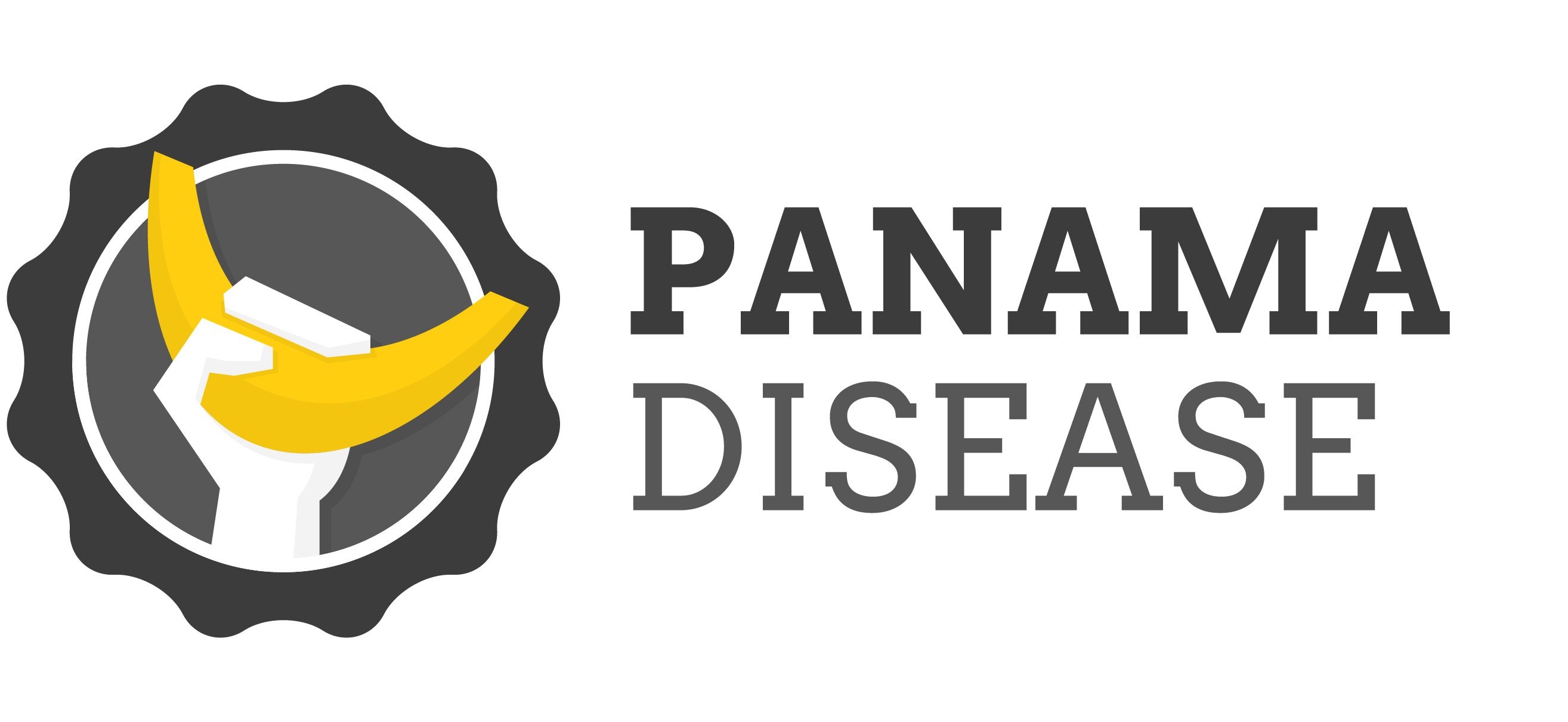

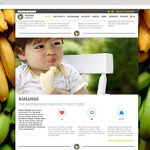














Recent Comments